Quad-core smartphones under Rs. 20,000 compared: Which is the best for you?

Confused which mid-range quad-core smartphone is the one for you? We take a look at some of the key specs and the benchmark performance of sub-Rs. 20,000 quad-core smartphones
Ever since the launch of the Micromax A116 Canvas HD we have seen a flood of budget smartphones launch that boast of quad-core processors. These devices show off some homogenous specifications and their performance is at par with each other too. If someone tells you some crazy mumbo-jumbo that one smartphone is drastically different from the other in this category, just ignore it, as most of it is salesman talk.
Let us break some myths down for you. Most of these budget quad-core smartphones run on the MediaTek MT6589 chipset or the Qualcomm S4 Play MSM8225Q chipset. There are three variants of the MediaTek MT6589 chipset – the MediaTek MT6589, MT6589M and MT6589T.
The MT6589M is clocked at 1.2GHz, has the PowerVR SGX 544MP GPU clocked at 156MHz and supports the qHD display. A smartphone running on the MT6589M chipset will support an 8MP rear camera at max with the ability to record video in 720p.
The MT6589 on the other hand too is clocked at 1.2GHz along with the PowerVR SGX 544MP GPU clocked at 286MHz. Smartphones running the MT6589 support a full HD display, up to 13MP camera with 1080p video.
Coming to the MT 6589T we have a chipset with the CPU clocked at 1.5GHz with the PowerVR SGX 544MP GPU clocked at 357MHz. It too supports a full HD display along with a 13MP rear camera with full HD video capabilities.
So, put simply, the MediaTek MT6589 powers the mid-ranged budget quad-core devices, the MT6589M powers the entry level devices (usually sub-Rs. 10,000) and we are yet to see a flood of devices (premium mid-range) using the MT 6589T chipset hit the market. One highly anticipated device running this chipset is the iberry Auxus Nuclea N1.
Now that we have clarified the power under the hood of these quad-core smartphones for you, here is a quick look at the specifications of some of the sub Rs. 20,000 quad-core smartphones available in the market today.
|
Models
|
Micromax Canvas HD
|
Micromax Canvas 4
|
Karbonn Titanium S9
|
iberry Auxus Nuclea N1
|
Xolo Play T1000
|
Lava Iris 504Q
|
Xolo Q1000
|
Spice Stellar Pinnacle Pro
|
Zen Ultrafone HD
|
Videocon A55HD
|
Xolo Q700
|
Karbonn S5 Titanium
|
|
OS
|
Android 4.2
|
Android 4.2
|
Android 4.2
|
Android 4.2
|
Android 4.1.1
|
Android 4.2
|
Android 4.2
|
Android 4.2
|
Android 4.2
|
Android 4.2
|
Android 4.2
|
Android 4.1
|
|
Display Size
|
5-inch
|
5-inch
|
5.5-inch
|
5-inch
|
4.7-inch
|
5-inch
|
5-inch
|
5.3-inch
|
5.3-inch
|
5-inch
|
4.5-inch
|
5-inch
|
|
Display Type
|
IPS LCD
|
IPS LCD
|
IPS LCD
|
IPS LCD
|
NA
|
IPS LCD
|
IPS LCD
|
IPS LCD
|
IPS LCD
|
IPS LCD
|
IPS LCD
|
IPS LCD
|
|
Display Resolution
|
1280 x
720 |
1280 x
720 |
1280 x 720
|
1920 x 1080
|
1280 x 720
|
1280 x 720
|
1280 x 720
|
960 x 540
|
1280 x 720
|
1280 x 720
|
960 x 540
|
960 x
540 |
|
Built-in storage
|
4GB
|
16GB
|
16GB
|
4GB
|
4GB
|
4GB
|
4GB
|
16GB
|
4GB
|
4GB
|
4GB
|
4GB
|
|
Expandable storage
|
up to 32GB via a microSD card
|
up to 32GB via a microSD card
|
up to 32GB via a microSD card
|
up to 64GB via a microSD card
|
up to 32GB via a microSD card
|
up to 32GB via a microSD card
|
up to 32GB via a microSD card
|
up to 32GB via a microSD card
|
up to 32GB via a microSD card
|
up to 32GB via a microSD card
|
up to 32GB via a microSD card
|
up to 32GB via a microSD card
|
|
Processor
|
1.2GHz 4-core
|
1.2GHz 4-core
|
1.2GHz 4-core
|
1.5GHz 4-core
|
1.5 GHz (4 1 core) NVIDIA Tegra 3
|
1.2GHz 4-core
|
1.2GHz 4-core
|
1.2GHz 4-core
|
1.2GHz 4-core
|
1.2GHz 4-core
|
1.2GHz 4-core
|
1.2GHz 4-core
|
|
RAM
|
1GB
|
1GB
|
1GB
|
1GB
|
1GB
|
1GB
|
1GB
|
1GB
|
1GB
|
1GB
|
1GB
|
1GB
|
|
Rear Camera
|
8MP
|
13MP
|
13MP
|
13MP
|
8MP
|
8MP
|
8MP
|
8MP
|
8MP
|
8MP
|
5MP
|
8MP
|
|
Front Camera
|
2MP
|
5MP
|
5MP
|
8MP
|
2MP
|
2MP
|
1.2MP
|
5MP
|
3.2MP
|
3.2MP
|
0.3MP
|
2MP
|
|
Dual-SIM
|
Yes
|
Yes
|
Yes
|
Yes
|
No
|
Yes
|
Yes
|
Yes
|
Yes
|
Yes
|
Yes
|
Yes
|
|
Battery
|
2000
mAh |
2000
mAh |
2600 mAh
|
2800 mAh
|
2000 mAh
|
2000 mAh
|
2100 mAh
|
2550 mAh
|
2000
mAh |
2000
mAh |
2400 mAh
|
2000 mAh
|
|
Price
|
Rs.
13,850 |
Rs.
17,999 |
Rs. 19,990
|
Rs. 18,000
|
Rs. 15,999
|
Rs. 13,499
|
Rs. 14,999
|
Rs. 14,990
|
Rs. 11,999
|
Rs.
13,499 |
Rs. 9,000
|
Rs. 10,925
|
All the smartphones in our list run on the run on the MediaTek SoC except the Xolo Play that runs on the Tegra 3 chipset and the Karbonn S9 Titanium and the S5 Titanium that runs on Qualcomm chipsets.
We have tested quite a few of these smartphones and here is a look at how they performed in the benchmark tests.
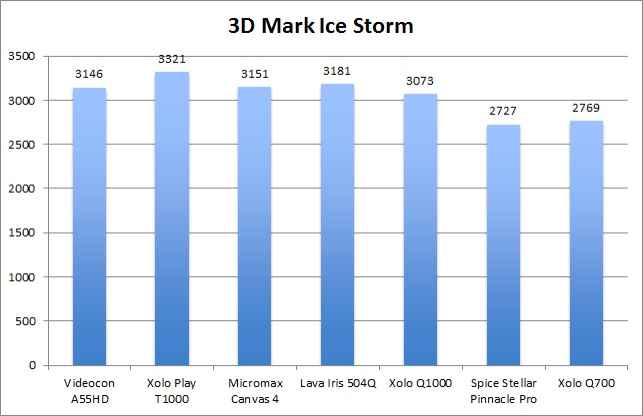 |
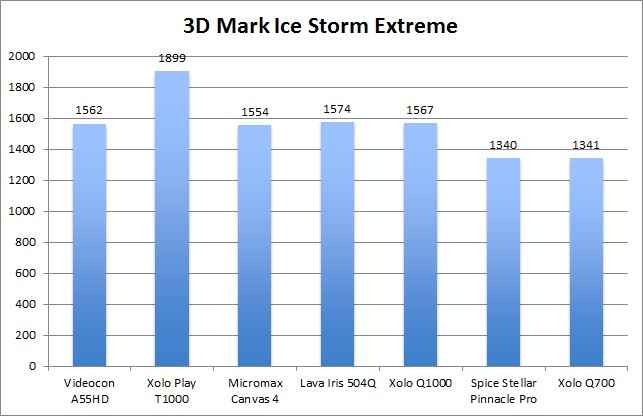 |
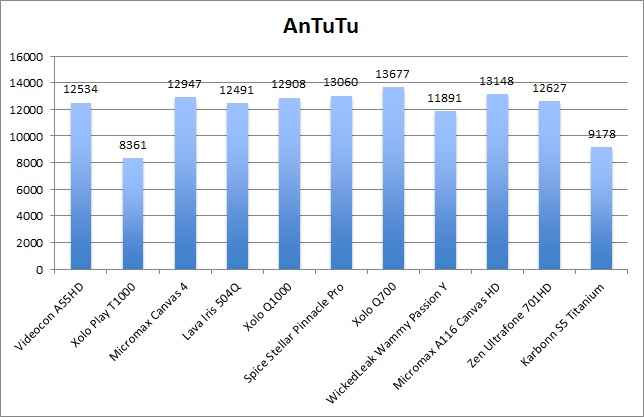 |
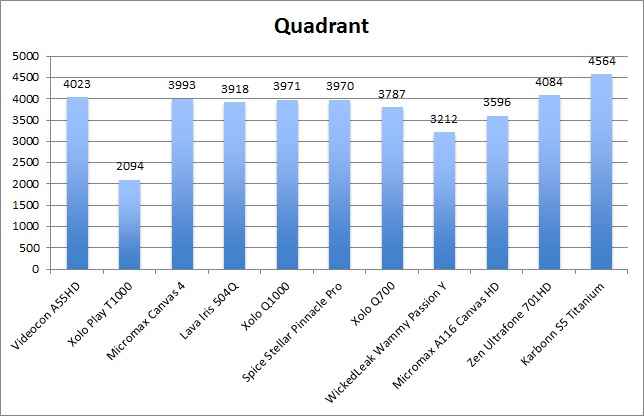 |
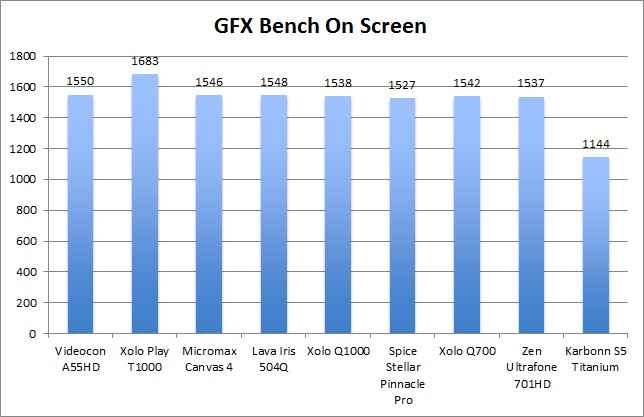 |
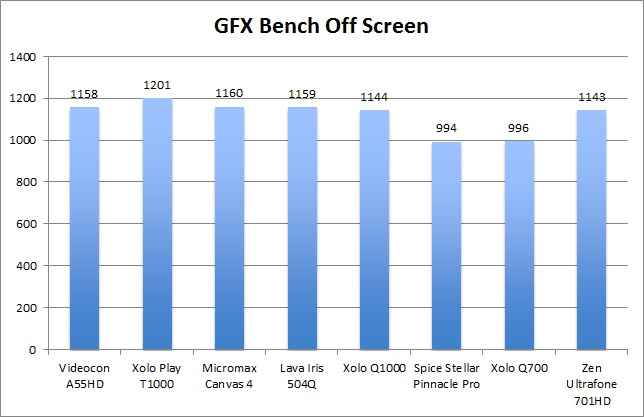 |
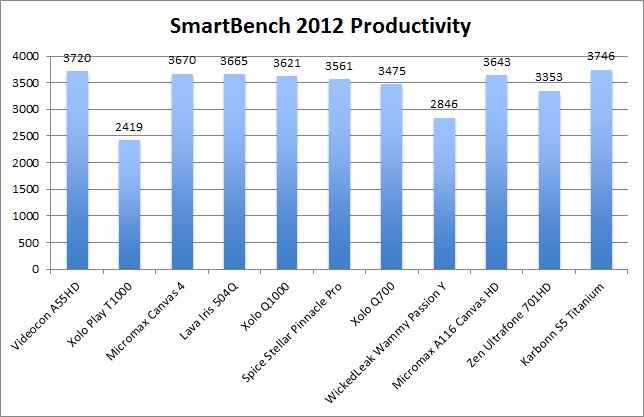 |
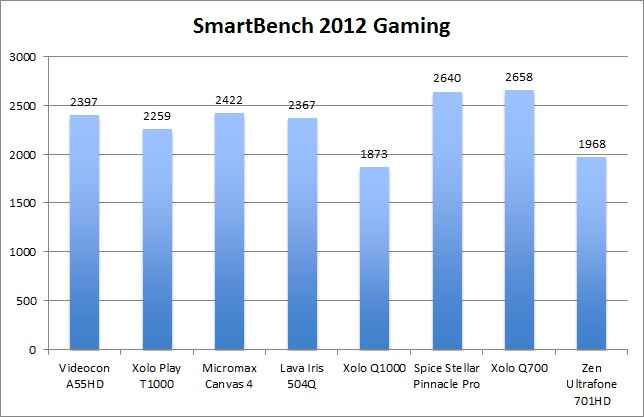 |
As you can see from the above benchmarks, almost all the scores are at par with one another. Variation may come in the case of the Xolo Play and the Karbonn S5 since these two devices don’t run on the MediaTek SoC. The S5 runs on Qualcomm and the Play on the Tegra 3 SoC.
So, if the performances are homogenous along with the specifications, then what is the distinguishing feature of the smartphone? What is your motivation for picking one over the other? Well, to start with, the brand name and the after sales service. This is very subjective and based on a user’s experience with a particular brand. It will vary from person to person. The second reason is the preloaded apps that come with the smartphone. Spice gives its users cloud storage along with some preloaded security apps along with the Stellar Pinnacle Pro, and the camera performs well. The Canvas HD and the Canvas 4 gives user preloaded local content via the M!Store. The Canvas 4 also comes with a slew of gesture-based features, as does the Lava Iris 504Q, though its are a little more gimmicky. If gaming is a primary need for you then you can consider the Xolo Play. If a simple raw Android experience is what you are after then the Zen Ultrafone 701 HD and the Xolo Q1000 are your weapons of choice.
What do you think? Is the market flooded with too many homogenous quad-core phones or is it nice to see that the consumer has such a wide variety to choose from? Let us know in the comment section below.
